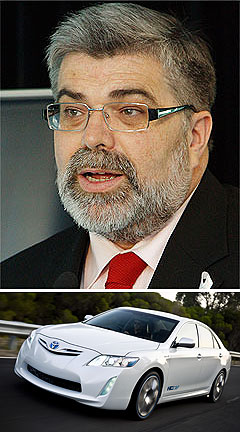Make / Model Search
News - General NewsNew 2020 automotive vision revealedVolt ahead: Australian governments want the Australian motor industry to lead the world in next-generation electric vehicle technology. Government releases the first phase of its 2020 automotive industry roadmap29 Sep 2009 GOVERNMENTS at federal and state levels have urged the Australian automotive industry to become a world leader in zero-emissions vehicle technology to shore up its manufacturing future. The call was revealed as part of the first phase of the government-sponsored Automotive Australia 2020 Project, after a Vision Workshop attended by key automotive industry stakeholders in Melbourne recently. Co-presented on Monday (September 28) by federal industry minister Kim Carr and his Victorian state counterpart Martin Pakula, the first phase of the national automotive industry roadmap calls for a shift from traditional car-making to making of zero-emissions vehicle technology for a global audience. “Australia’s automotive industry must achieve recognition as a strategic element of the global automotive industry to be attractive to global companies and their investors,” said the paper. “Australia must have a sustainable, profitable vehicle manufacturing industry with global reach that maximises opportunities in local and international markets. “The industry must be bigger, more productive and provide more jobs in the manufacturing and supply sectors. This can be achieved through leveraging existing strengths and building new capabilities,” it said.  Left: Federal industry minister Kim Carr. Below: The Camry Hybrid concept. Left: Federal industry minister Kim Carr. Below: The Camry Hybrid concept.The paper suggested Australia should become a world authority for a new generation of zero-emission vehicles by 2020, despite the fact such technology has never been produced in Australia and is currently in its infancy in major global population centres including Japan, the US and Europe. It urges Australia to become one of the world’s leading designers and producers of large, powerful, zero-emission passenger cars. “This game-changing initiative will use Australia’s strategic strengths and capabilities, supported by investment attraction and focused government support, and will meet the identified and emerging needs of the global automotive market,” said the paper. “By leading development in this segment, Australia will own a greater portfolio of (intellectual property) and become the industry of choice for design, engineering and testing of globally desirable fuel-efficient and environmentally responsible products.” Managed by the Co-operative Research Centre for Advanced Automotive Technology (AutoCRC) and supported by both the federal and Victorian governments, the 2020 automotive industry roadmap is expected to be completed by April 2010. It was endorsed by the Automotive Industry Innovation Council, which was formed as part of the Rudd government’s $6.2 billion New Car Plan for a Greener Future, with the aim of identifying and mapping the industry’s capabilities and needs to 2020 and beyond. According to Senator Carr, the roadmap will allow the industry to play to its strengths by identifying trends, drivers, needs and capabilities, and supporting innovative technologies with strong commercial potential. “The council has played an extremely important role in getting industry commitment to developing this technology roadmap,” Senator Carr said. “The Rudd government will continue to work in close partnership with the automotive industry to develop a comprehensive roadmap for a sustainable future. “This vision report is a crucial first step in developing a roadmap that will drive innovation and continue to support high-wage, high-skill jobs in this vital manufacturing sector.” Mr Pakula said the roadmap built on the Victorian Automotive Manufacturing Action Plan. “This roadmap, combined with the action plan, is further evidence of the Brumby government’s hands-on approach to working with the automotive industry,” he said. “The Brumby government will continue to work with companies, unions and communities to secure jobs and ensure that we retain critical skills and capabilities in Victoria.” While Toyota will release Australia’s first locally built petrol-electric vehicle, the 2010 Camry Hybrid, in February, Holden is so far the only Australian car-maker to confirm its capability and desire to produce a zero-emissions vehicle. General Motors’ Chevrolet Volt, which Holden has committed to selling in Australia from 2012, is a plug-in hybrid vehicle based on the same Delta II platform that Holden will put into production for the local Cruze sedan and hatch in September 2010. Ford Australia has cancelled plans to produce the brand’s next-generation Focus Australia from 2011, and along with it any capability to produce hybrid and/or electric versions of the company’s global small-car. Having established a vision as part of its first phase, the roadmap, which will have a lifespan of just 10 years when completed, will now move into the final five of six stages. They include defining immediate domestic and long-term future global market needs, understanding national capabilities, identifying key tactical and strategic opportunities, strategic opportunity roadmap development and prioritisation. Among those responsible for establishing the vision statement as part of phase one of the 2020 roadmap were representatives from state and federal government, local car-makers Ford, Holden and Toyota, tyre companies, unions, academics, scientists and automotive components suppliers.  Read more |
Click to shareGeneral News articlesResearch General News Motor industry news |











Facebook Twitter Instagram